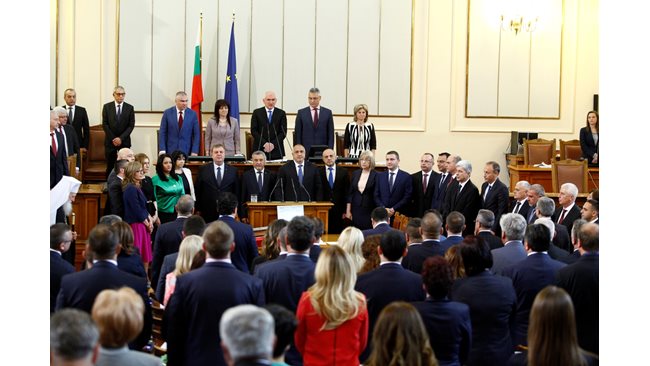According to the constitution, you cannot be at the same time MP in the executive branch, also affects the regional governors. It happened in 2009, but then it was clear that there would be a new government soon
The President is in no hurry with the decree convening the National Assembly
Should 14 ministers and two of their deputies leave parliament immediately after their oath as GERB MPs?
Are the next ones on the party lists, or are Boyko Borissov’s ministers simply remaining in their positions in the executive branch and postponing their parliamentary oath until a new cabinet is elected. Then, however, the GERB group was left with 14 people less.
It is more likely colleagues from the next places in the lists
to become deputies
just for a month or two,
then to cede to the ministers from “Borisov 3”, who will return to the banks, commented a lawyer from the ruling party.
The case arises because, according to the constitution, you cannot be an MP and at the same time be in the executive branch, reminds Assoc. Prof. Natalia Kiselova, Doctor of Constitutional Law, longtime adviser and secretary of the previous two presidents on legal issues. (See her interpretation of “24 Hours” below.)
So far, there has been a similar case only in 2009, but then the ministers elected as deputies were among the parties that lost the elections, and it is clear that the winner (GERB) will soon nominate a new cabinet. And they are far smaller. In the case of 12 years ago, the resigned Prime Minister Sergei Stanishev also became chairman of the new BSP General Assembly.
Now, as soon as the parliament is constituted, the government of Boyko Borissov will constitutionally submit its resignation to him. Separately, it is not clear when the president will convene the 45th National Assembly. Let the CEC first publish the names of the elected deputies in the State Gazette, Rumen Radev said last night. This will happen today, but the president’s comment means that in the same issue of the State Gazette one cannot wait for his decree to convene the National Assembly. The assumptions are, however, that the parliament will meet on April 15, Thursday, or the 16th.
And resigned, the government will continue to work until a new one is elected – it is unclear when.
The most accurate in the case with the ministers is the text in the Anti-Corruption Law, according to which the 14 members of the “Borisov” cabinet
have a one-month
deadline to decide whether
to be ministers,
or deputies
Tomislav Donchev, Ekaterina Zaharieva, Kiril Ananiev, Desislava Ahladova, Kostadin Angelov, Hristo Terziiski, Petya Avramova, Denitsa Sacheva, Krassimir Valchev, Desislava Taneva, Rosen Zhelyazkov, Lachezar Borisov, Temenuzhka Petkova and Krasen fall into this hypothesis. Also deputy. the regional minister Nikolay Nankov, but by law his place as an MP is not preserved.
If Rosen Zhelyazkov chooses to be a minister, he will be replaced by another deputy – Georg Georgiev from Foreign Affairs, and so he will find himself in Nankov’s situation. The regional governor of Plovdiv region Dani Kanazireva has already decided to be an MP, “24 Chasa” has learned.
If the ministers elected as deputies do not resign from the National Assembly and remain in their capacity as MPs, then all the acts they adopt can be subsequently declared null and void due to constitutional incompatibility, lawyers warn. “My colleagues and I support the view that the CEC should announce new MPs in their place,” explained Assoc. Prof. Kiselova.
In this case
here are who they will be
the new temporary
deputies:
Prof. Lyubomira Popova (Veliko Tarnovo, instead of Prof. Kostadin Angelov), Miroslav Asparuhov (Vratsa, instead of Petya Avramova), Nikolay Sirakov (Gabrovo, instead of Tomislav Donchev), Zornitsa Mihaylova (Dobrich, instead of Denitsa Sacheva), Daniel Alexandrov, Kyustendil, in place of Hristo Terziiski), Irina Miteva (Lovech, instead of Nikolay Nankov), Naiden Shopov (Pazardzhik, in place of Ekaterina Zaharieva), Alexander Alexandrov and Hristina Georgieva (Pernik, replaces Kiril Ananiev and Desislava Akhladova), Alise Murtezova replaces Krasen Kralev), Plamen Krumov (Sliven, instead of Desislava Taneva). From Sofia’s 24th MIR, the next on the list is Georg Georgiev, who will eventually remain Deputy Foreign Minister and thus issue an order to Prof. Ana Kocheva. In Stara Zagora Lachezar Borisov will vacate a place for Radostin Tanev, and Mitko Staykov will enter Targovishte instead of Temenuzhka Petkova. Instead of Krassimir Valchev from Shumen, Ilter Beizatov should become an MP, albeit in a month or two.
Assoc. Prof. Natalia Kiselova, Doctor of Constitutional Law, Lecturer in the Department of Constitutional Law at Sofia University:
After the first meeting, the ministers
in resignation must come out of
Parliament and in their place
to enter the next in the lists
The constitution states that at the first sitting before the newly elected National Assembly, the old Council of Ministers resigned. After the oath and the solemn part, it must be announced that the resignation of the government has been received. This can be announced before the opening of the meeting, purely in the media, it is a matter of discretion on the part of PR.
There are two opinions on how to proceed with members of the government that resigned.
Until 2009, as the ministers elected as deputies were few – less than 10 in a parliamentary group, which is not the first in number, they combined, ie. they were both resigned ministers and elected members of parliament.
Since 2009, there has been no case of an old government advocating a new National Assembly because the governments were caretaker.
Now, as there are an awful lot, if I’m not mistaken, 14 ministers from one parliamentary group have been elected deputies, this could create tension from day one.
For this reason, my colleagues and I support the view that they should resign, swear in as MPs, come out after the first sitting and in their place the CEC should announce new MPs – the next on the list.
First, in this way the balance of power is preserved, ie the GERB parliamentary group will have all members of parliament available.
Second, they will be subject to parliamentary scrutiny. If they are deputies and ministers in resignation, calling them in what capacity they will appear if they have not left the parliament. They could say: “We are MPs, we will not answer.” But otherwise they have not vacated the seats in the Council of Ministers. For this reason, they should only be ministers, and in their place should be the next on the lists.
Requests are now being made to make changes in the Electoral Code, changes in the vaccination plan, the Personal Bankruptcy Act. These are things that require adequate ministers, not ones that are torn between the National Assembly and the Council of Ministers.
That is why I think that the next on the lists should come out and be replaced as deputies.
The other view is the practice until 2009, but then there were clear majorities that formed a government almost immediately.
The constitution states that a member of parliament elected as a minister terminates his duties as a member of parliament. The question is by chosen what is meant – elected by the same National Assembly or elected by the previous one.
The constitution thought there would be clear majorities to form a government. If it is clear that it forms the first force, it will not be a drama. But since there is expected to be a second or possibly a third, then a problem arises. And by entering those after them, it is ensured that the majority is preserved.
Resigned ministers may not take the oath, and to do so further, but then the parliamentary group will have fewer MPs. They will resign until the next government is elected, and since it is unknown how long, I think it would be wiser for other people to come in.
The deadlines for how long it is possible for both MPs and resigned ministers to be both can be seen in the Anti-Corruption Act. There is a text that says that within a month, the one who is elected or appointed must get rid of his incompatibility. In my opinion, the understanding prevails that when you are both a Member of Parliament and a Minister, you cannot wait a month, it is more reasonable, taking an oath, for the next ones to enter.
In the case of deputy and regional ministers, if they remain in office, they lose the right to become deputies later.
– .


:quality(85)//cloudfront-us-east-1.images.arcpublishing.com/infobae/YBZ2P6CRRNFQHFUMLQXWHCX2QA.png)